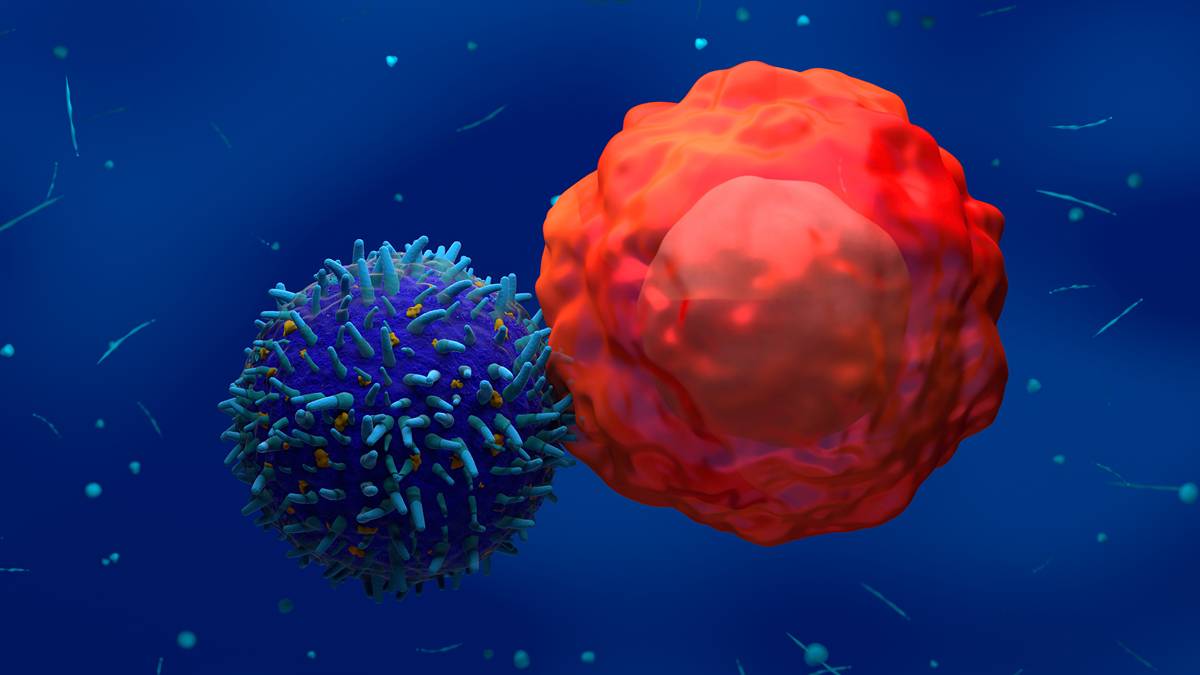ASX biotechs join global race for cell therapy breakthroughs

ASX biotechs are working to advance cell therapies. Pic: Getty Images
- ASX biotechs target global cell therapy market, projected to reach ~US$48bn by 2034
- Arovella the only ASX-listed biotech delving into CAR iNKT therapies and one of few globally
- Chimeric aims to ‘break new ground’ in treatment of solid tumours with CAR-T and NK cell assets
Cell therapies represent a promising frontier in modern medicine, offering potential to treat, and in some cases cure diseases previously considered untreatable.
By using living cells, either from the patient (autologous) or a donor (allogeneic), cell therapies aim to repair, replace, or enhance biological functions within the body.
Originally pioneered for blood cancers through technologies like chimeric antigen receptor (CAR) T-cell therapies, the field is rapidly expanding into solid tumours, autoimmune conditions, and neurological diseases.
Australia has close ties to CAR T-cell therapy development. Melbourne-based Cell Therapies Pty Ltd, the country’s largest Therapeutic Goods Administration (TGA) licensed cell and gene therapy manufacturer, was the commercial production partner for Novartis’s Kymriah – the first CAR T-cell therapy approved by the US Food and Drug Administration (FDA) in 2017.
While the science remains complex, advances in manufacturing, engineering, and clinical design are making next-generation cell therapies more accessible and scalable, positioning them as a key pillar of future healthcare.
Several ASX biotechs are positioning themselves at the forefront of cell therapies to capture a share of the global market, which accounted for ~US$6.04 billion in 2024 and is anticipated to close in on US$48bn by 2034, growing at a CAGR of almost 23%.
In particular focus here is the treatment of solid tumours, which account for 90% of all cancers but have so far proven difficult to treat with cell therapies.
Arovella in rare biotech club targeting CAR-iNKT therapies
Arovella Therapeutics (ASX:ALA) is the only ASX-listed biotech delving into CAR Invariant Natural Killer T-cells (iNKT) therapies, and one of only a few globally.
CEO Dr Michael Baker told Stockhead iNKT cells were distinct from the more familiar natural killer, or NK cells, which along with T-cells had limitations.
T-cells can’t be used off-the-shelf unless they are genetically engineered. While NK cells can quickly eliminate abnormal cells such as tumour cells, iNKT cells go further. Not only do they kill like T and NK cells, but they also trigger a longer-lasting response by activating other key parts of the immune system.
Because iNKT cells recognise foreign threats differently – unlike classic CAR-T cells – it has been shown in clinical trials that iNKT cells do not cause complications like graft-versus-host disease (GvHD) when administered from a healthy donor to a patient.
The FDA has approved seven CAR-T therapies to date, all for blood cancers, but no iNKT treatments.
While over 120 global trials are investigating CAR-NK therapies for blood and solid tumours, CAR iNKT research remains limited.
Baker said most cell therapies use the patient’s own cells (autologous), but this was costly, slow, and relies on compromised cells.
Arovella is taking an allogeneic approach, using healthy donor cells to create off-the-shelf, frozen doses shipped to clinics as needed in a “ready-to-use” model.
Its lead therapeutic ALA-101 combines iNKT cells with a CAR that targets CD19, a protein commonly found on B-cell blood cancers like lymphoma and leukaemia.
One of Arovella’s next key milestones is to apply to the FDA for its first-in-human trial, enrolling non-Hodgkin’s lymphoma and leukaemia patients.
The company’s other key goal is also tackling solid tumours.
“The first approved blood cancer targeting CAR-T products have demonstrated just how important cell therapies will be for cancer treatment,” Baker said.
“We look forward to using our CAR-iNKT cell platform to expand upon that work and aim to create products capable of increasing access and reducing costs.
“There is a lot of great science that will continue to advance the off-the-shelf cell therapy sector.
“That is why we continue to scour the globe for new IP to build into our CAR-iNKT platform, to either strengthen our CAR-iNKT cells or to broaden the cancer types that we can target.”
Imugene also aims to crack solid tumours
Imugene (ASX:IMU) is developing cell-based immunotherapies, including allogeneic CAR T-cell therapies, oncolytic viruses and B-cell vaccines, to address both blood cancers and solid tumours.
The company’s lead cell therapy candidate azercabtagene zapreleucel (azer-cel) is an off-the-shelf CAR T-cell therapy targeting CD19, a protein commonly expressed on malignant B-cells. There are no allogeneic (off the shelf) CAR T therapies approved to date.
Azer-cel is currently undergoing clinical trials for the treatment of relapsed or refractory diffuse large B-cell lymphoma (DLBCL), a hard-to-treat form of non-Hodgkin’s lymphoma.
In early-phase studies, azer-cel has demonstrated promising results, including high complete response rates and durable remissions in patients who have previously relapsed after autologous CAR T-cell therapies.
“We are very pleased with the continued positive data coming from the azer-cel trial, which further reinforces its potential as a treatment for lymphoma patients who have failed on several previous therapies including auto CAR T,” CEO and managing director Leslie Chong told Stockhead.
Imugene’s next-generation cell therapy platform OnCARlytics is designed to help overcome one of the biggest challenges in cancer treatment, making solid tumours visible to the immune system.
The approach combines Imugene’s proprietary CF33 oncolytic virus, which selectively infects and destroys cancer cells, with CD19-targeting CAR T-cells.
The CF33 infects tumour cells and forces them to express CD19, a marker typically found on blood cancer cells but absent on solid tumours.
By introducing CD19 into the tumour environment, the therapy effectively tags the cancer, allowing CD19-specific CAR T-cells to recognise and attack the tumour.
Imugene’s pipeline also includes multiple immunotherapy B-cell vaccine candidates, which involve inducing the body to produce polyclonal antibodies against specific tumour-associated antigens.
The company’s PD1-Vaxx is designed to generate antibodies that block the PD-1 receptor, potentially mimicking the effects of checkpoint inhibitors such as pembrolizumab (Keytruda).
The company recently announced the first patient had been dosed in Australia as part of an investigator-sponsored Phase II Neo-POLEM clinical trial, which is evaluating PD1-Vaxx’s potential to improve treatment outcomes for patients with mismatch repair-deficient/microsatellite instability-high (dMMR/MSI-high) colorectal cancer.
This aggressive cancer subtype accounts for ~15% of all colorectal cancer cases.
Chimeric advances cell therapy assets in solid tumours
Chimeric Therapeutics (ASX:CHM) has three CAR T and NK cell assets in clinical trials. It has an ongoing phase 1/2 clinical trial for its novel CHM CDH17 CAR T-cell therapy targeting advanced colorectal cancer and Neuroendocrine tumours of the midgut.
Their second program CHM CLTX CAR T is in a phase 1B clinical trial in recurrent/progressive glioblastoma, a form of brain cancer.
CHM CORE-NK is a potentially best-in-class, clinically validated NK cell platform. Data from the complete phase 1A clinical trial, demonstrated safety and efficacy in blood cancers and solid tumours.
Two additional Phase 1B clinical trials investigating CHM CORE-NK in combination regimens have been initiated in Acute Myeloid Leukemia (AML).
“We’re excited to be actively advancing in the clinic and pushing through dose levels as we break new ground in the solid tumour CAR T-cell therapy space,” CEO Dr Rebecca McQualter told Stockhead.
Prescient advancing cell therapy platforms
While predominately focused on PTX-100, its first-in-class compound with the ability to block an important cancer growth enzyme geranylgeranyl transferase-1 (GGT-1), Prescient Therapeutics (ASX:PTX) is also advancing its proprietary OmniCAR and CellPryme platforms.
OmniCar has potential to allow CAR T therapy cells to be more targeted, safer, more effective, cost-effective and of longer duration.
CellPryme is a complementary application to OmniCar split into two components. CellPryme-M produces superior cells that are more potent and last longer, aiming to double tumour control.
Meanwhile, CellPryme-A acts as an adjuvant therapy, increasing the expansion of CAR T-cells and enhancing their ability to penetrate the tumour.
AdAlta adopts East to West cellular immunotherapy strategy
AdAlta (ASX:1AD) and venture capital firm SYNthesis BioVentures Fund (SYNBV) launched AdCella in 2024 to adopt an East to West strategy and bring cutting-edge cellular immunotherapies from Asia, particularly China, into Western markets.
SYNBV was co-founded by Professor Andrew Wilks, who alongside Amplia (ASX:ATX) CEO Dr Chris Burns received the 2024 Prime Minister’s Prize for Innovation for co-inventing momelotinib, an FDA-approved treatment for myelofibrosis.
The strategy leverages AdAlta managing director and CEO Dr Tim Oldham’s deep expertise in cellular immunotherapies and extensive operational experience in Asia to identify and advance promising Asian cellular therapies that can be transitioned into regulated western markets.
Oldham was previously CEO of Cell Therapies and said he’d been fortunate to witness firsthand the rapid evolution of China’s biotech sector and remarkable progress in cellular immunotherapies for cancer treatment over the past 15 years.
The East to West cellular immunotherapy strategy for cancer is now a core growth priority for AdAlta and a key driver of future pipeline growth and value creation.
At Stockhead, we tell it like it is. While Arovella Therapeutics is a Stockhead advertisers, it did not sponsor this article.

UNLOCK INSIGHTS
Discover the untold stories of emerging ASX stocks.
Daily news and expert analysis, it's free to subscribe.
By proceeding, you confirm you understand that we handle personal information in accordance with our Privacy Policy.








